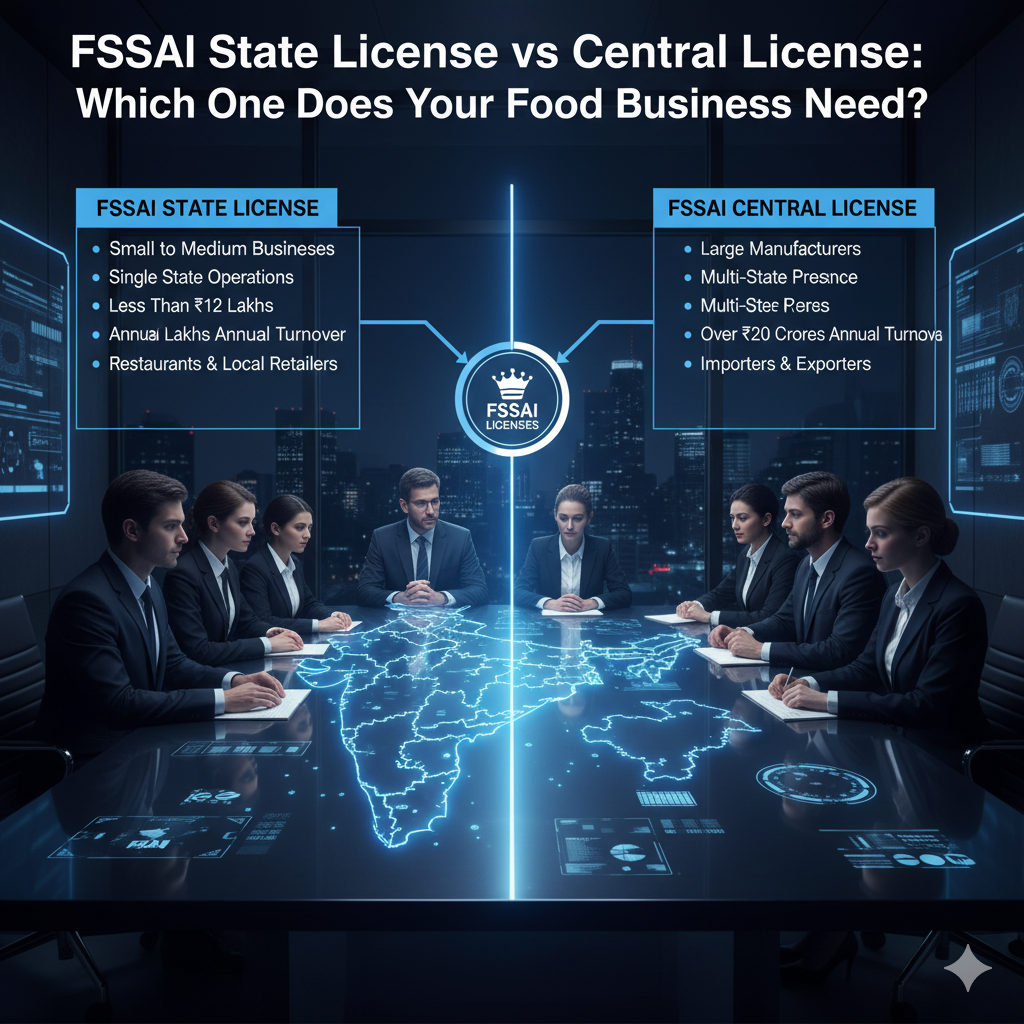Food safety is a top priority in India, and the Food Safety and Standards Authority of India (FSSAI) ensures that food products meet high-quality standards. For food businesses, obtaining FSSAI registration is not just a legal formality—it is essential for compliance, consumer trust, and smooth business operations. Understanding the difference between an FSSAI State License and a Central License is crucial for food entrepreneurs to determine which one suits their business.
What is FSSAI Registration and Licensing?
FSSAI registration is mandatory for all food businesses in India. Depending on the scale and nature of the business, operators must either apply for a Basic FSSAI Registration, obtain a State License, or a Central License. Small-scale businesses with low turnover can opt for basic registration, while medium and large businesses must obtain state or central licenses.
FSSAI State License
The FSSAI State License is designed for medium-sized food businesses operating within a single state. Generally, businesses with an annual turnover of more than ₹12 lakh but less than ₹20 crore need a state license. It covers manufacturers, processors, traders, storage units, and transporters whose operations are confined to one state.
Key Features of State License:
- Applicable for medium-scale businesses operating locally within a state.
- Issued by the State Food Authority.
- Requires periodic renewal, usually every 1–5 years.
- Businesses must comply with state-specific food safety regulations alongside national standards.
Who Needs a State License?
- Medium-sized food manufacturers.
- Restaurants and catering services with significant turnover.
- Wholesalers and distributors operating within a single state.
FSSAI Central License
The FSSAI Central License is required for large-scale food businesses or those operating across multiple states. Typically, businesses with an annual turnover exceeding ₹20 crore, or those involved in import/export, large-scale manufacturing, or high-risk food categories, must obtain a central license.
Key Features of Central License:
- Applicable for large-scale or multi-state operations.
- Issued by the Central Food Authority under the FSSAI.
- Mandatory for importers, exporters, and high-risk food products.
- Requires strict compliance with national food safety standards and periodic audits.
Who Needs a Central License?
- Large food manufacturers and processors operating across multiple states.
- Importers and exporters of food products.
- Businesses involved in high-risk food segments such as dairy, meat, and beverages.
Factors to Consider When Choosing a License
Selecting the correct FSSAI license depends on several factors:
- Business Size and Turnover: Small businesses with low turnover can opt for basic FSSAI registration, while medium and large businesses must choose a state or central license.
- Operational Area: Businesses operating within a single state generally require a state license, whereas multi-state or national operations need a central license.
- Nature of Food Products: High-risk food categories or products meant for export often require a central license regardless of turnover.
- Legal Compliance: Obtaining the appropriate license ensures compliance with the Food Safety and Standards Act, helping avoid penalties and legal complications.
Benefits of Choosing the Right License
Obtaining the correct license, along with FSSAI registration, offers several advantages:
- Legal Security: Protects the business from fines, penalties, and possible closure.
- Consumer Trust: A valid license reassures consumers about the safety and quality of products.
- Market Access: Many retailers, e-commerce platforms, and government tenders require proper licensing and FSSAI registration.
- Standardization: Encourages adherence to food safety and hygiene standards, enhancing product credibility.
Conclusion
In India’s competitive food industry, understanding the difference between an FSSAI State License and a Central License is vital for business success. While the state license caters to medium-scale operations within a single state, the central license is designed for large-scale, multi-state, or high-risk food businesses. Choosing the correct license, along with proper FSSAI registration, ensures legal compliance, builds consumer trust, expands market opportunities, and establishes the business as a responsible operator in the food industry. For food entrepreneurs, investing time and resources to secure the appropriate FSSAI license and FSSAI registration is a step toward long-term growth and credibility in the market.





Comments